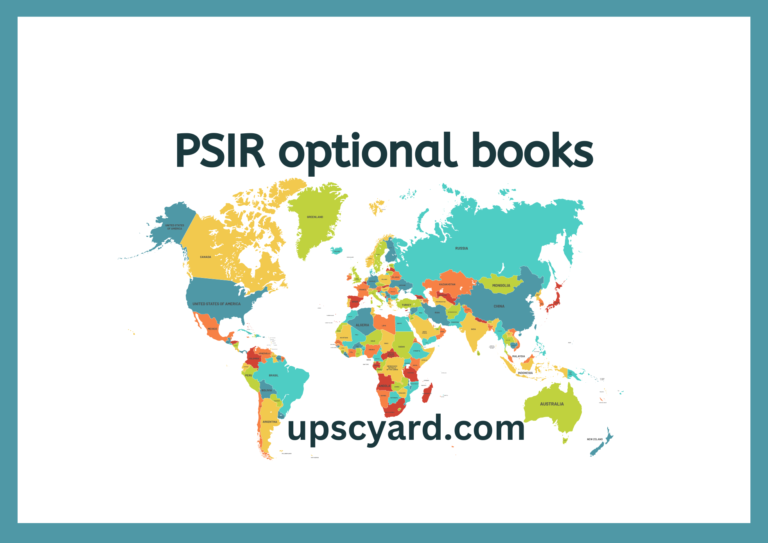UPSC Agriculture optional books
Click here for Agriculture detailed syllabus .
Agriculture optional Books for UPSC are valuable resources that cover both fundamental and advanced information about various topics related to farming and the environment. These books delve into subjects such as ecology, agronomy, weed science, forestry, cell biology, and plant breeding. For candidates who have chosen agriculture as an optional subject for the UPSC exam, these books are essential for their preparation. Agriculture is considered a scoring optional subject, which is why many aspirants opt for it. Moreover, a solid understanding of the upsc Agriculture optional Books for UPSC will also help candidates in their General Studies preparation by providing insights into topics like geography, social issues, and economics.
If you have a background in agriculture, life sciences, or related fields, selecting the best agricultural books for UPSC will be easier for you. However, candidates without a relevant agricultural background may find it challenging to choose the appropriate books for the Agriculture Optional UPSC. To assist with this, we have compiled a list of highly recommended UPSC agriculture optional books that can serve as valuable resources for your preparation.
UPSC Agriculture optional books , strategy
When it comes to covering the UPSC Books for better results, candidates should keep in mind a few essential points. The UPSC Syllabus is vast, and preparing for each subject within a limited timeframe requires dedication, hard work, and focus. To efficiently complete the UPSC Agriculture optional Books for UPSC, candidates need to adopt a strategic approach. Below, we will discuss some strategies that can help candidates enhance their preparation with agriculture books and achieve good marks.
- Familiarize yourself with the agriculture syllabus for UPSC and begin with the basic agriculture UPSC books recommended for the syllabus.
- Mark the topics in the books that you need to cover, ensuring a systematic approach to your studies.
- Divide your preparation for Paper-1 and Paper-2 separately to reduce the feeling of burden and facilitate focused learning.
- Select agriculture books that are easy for you to understand and align with your comfort level.
- Remember that it is not necessary to read every single UPSC agriculture optional book available. Choose wisely and prioritize quality over quantity.
- Create concise and effective short notes while studying from the books, as they will prove invaluable during the revision period.
By following these strategies, candidates can optimize their preparation with UPSC agriculture optional books, leading to improved understanding of the subjects and better performance in the UPSC agriculture optional exam.
UPSC Agriculture optional Books for Paper 1
The first section of the UPSC agriculture syllabus, known as Paper-1, encompasses a range of subjects including ecology, forestry, agricultural extension, agronomy, soil, and water conservation. A total of 250 marks will be allocated for questions related to these topics. To excel in this section, it is recommended to refer to the following highly regarded UPSC Agriculture Optional Books:
- Agronomy – Authored by Yellamanda Reddy
- Current affairs from The Hindu: Survey of Indian Agriculture and Special Issues of Agriculture.
- Fundamentals Of Agricultural Extension Education by U Barman
- Soil Science – Choose either D.K Das or Brady as your reference book
- Agricultural Extension Education in India
These books provide comprehensive coverage of the subjects mentioned, ensuring that you have a strong foundation and are well-prepared for the UPSC agriculture exam.
UPSC Agriculture optional Books for UPSC Paper-2
Paper-2 of the UPSC agriculture optional syllabus focuses on a variety of subjects including Plant Breeding, Cell Biology, Plant Physiology, Seed Production & Technology, Plant Protection Techniques, and Food Production & Nutrition Management. To effectively cover these topics and enhance your preparation for the UPSC agriculture exam, it is recommended to refer to the following top Agriculture Books for UPSC:
- Plant Breeding – Written by B.D. Singh
- Physiology – Authored by Pandey & Singha
- Genetics – By B.D. Singh
- Introduction To Horticulture – Kumar
- Special Issue of Agriculture by The Hindu
- The Hindu – Survey Of Indian Agriculture
- Entomology – Vasantha Raj & David
These books offer comprehensive insights into the subjects mentioned, providing you with a solid understanding of the key concepts and helping you excel in the UPSC agriculture exam.
Who can opt for Agricultural Optional?
Several candidate opt for agriculture optional available as it is actually an effortless racking up subject, however it is additionally important to understand concerning the fundamentals of our nation’s major line of work. If you are actually a pupil from agriculture, Ecology, Zoology or even any kind of science domain name, you may actually use up this subject as optional. Anticipation in Scientific research is actually obligatory to pick agriculture extra or it will be actually a challenging phase for the pupils to prep
Lets View the Agriculture Optional Approach by UPSC toppers
Right here are several of the necessary factors that you require to follow while composing agriculture Optional and also the tips below is a recap of Agriculture Optional Approach through UPSC topper.
- You ought to completely realize the syllabus and afterwards end up being a competence in agriculture domain.
- Rather than memorizing, understand the principles and also research even more on web rather than relying on the research study materials alone.
- Layouts, captions, review of the contexts, mind charts will certainly add worth to the solutions.
Besides, applicants need to concentrate much more on the methodical attributes and afterwards buildings too. - Additionally, get to know about the Agricultural policies that Government set up recently. The information about latest agricultural programs are offered in the Agriculture Ministry website and after that you can easily experience it for referral rather than analysing unstable resources.
In addition, the incredibly essential feature of the prep work is method. Don’t worry as you can obtain the previous years. inquiries documents as well as study the duplicated questions which is actually the very best method to prepare easily.
FAQ
To achieve success in the field of agriculture, candidates must begin their journey by delving into the fundamental agriculture books that establish a strong foundation. It is vital to comprehend the basic concepts thoroughly before venturing into more complex and advanced texts. A methodical approach is crucial, wherein candidates cover each topic mentioned in the syllabus, focusing on one topic at a time from a single book. Utilizing multiple books for the same topic often leads to confusion and hampers effective learning. Lastly, candidates should diligently create concise and informative short notes during their study sessions to facilitate efficient revision in the future. By following these steps, candidates can establish a solid base of knowledge and enhance their chances of success in the agriculture field.
Agronomy: Principles and Practices” by Shivendra Kumar Sharma
“Fundamentals of Crop Production” by Arun Katyayan
“Genetics: Analysis and Principles” by Robert J. Brooker
“Introduction to Soil Science” by D.K. Das
“Plant Breeding: Principles and Methods” by B.D. Singh
“Agroforestry: Principles and Practices” by P.K. Ramachandran Nair




